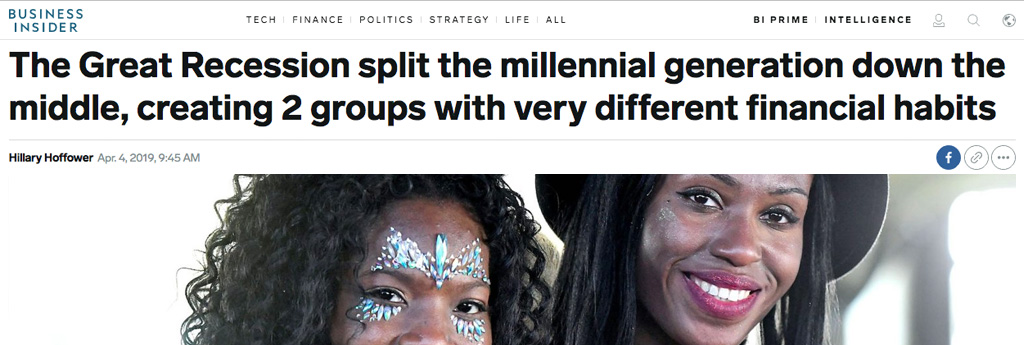
At The Center for Generational Kinetics, we are passionate about uncovering important generational trends, changes, and insights. These are the must-know generational insights that leaders can use to help understand and bridge generations.
An important generational trend our research team uncovered—and that we frequently feature in our Millennial keynote speeches—led to a feature article this month on Business Insider!
What we uncovered is that the Millennial generation is splitting into two… Economically, that is.
The split we uncovered…
Entering the workforce and adulthood in the thick of the Great Recession put the older generation of Millennials—who we classify as those over the age of 30 years old today—in a tricky economic position. Wages were low, instability was high and student-loan debt was hanging over their heads like a dark cloud with interest.
Not so for their younger siblings—the second phase of the Millennial generation (those under the age of 30 now). Not only did they have the benefit of learning from the stumbles and financial challenges that their older brethren faced as a result of the Great Recession, but they also found themselves entering adult life and the workforce when salaries finally began to increase and the economy was picking up speed.
The oldest Millennials
“The oldest Millennials delayed many of the traditional markers of adulthood, such as marriage, kids, and buying homes,” generational expert and speaker Jason Dorsey, co-founder of the Center for Generational Kinetics, told Business Insider.
The economic instability also prevented them from confidently socking away savings and planning for their financial futures, so much so that a 2018 report by the Federal Reserve Bank of St. Louis called these older Millennials the “lost generation” for wealth accumulation.
Now, after 15-20 years in the workforce, the first-half of the Millennial population is finally starting to feel the economic stranglehold loosen—but making up for that lost time will be difficult.
What this means for the generation
“Older Millennials are often realizing they’re going to have to play catch-up with their finances if they want to ever be able to retire,” Dorsey said. “Some of them have already decided that they likely will not ever be able to afford to retire.”
On the other end of the spectrum, however, is the younger half of the generation. Not only did they graduate (also with their share of student debt, mind you) into a workforce with more career opportunity and better starting salaries—but they came into their wealth-accumulation years with options where they could steer around the economic potholes of their older Millennial peers.
This has made them more aware of the dangers of economic instability—creating a younger Millennial population with practical money-management and spending habits as well as a determination to save for emergencies and retirement.
Change in their risk profile
“They are increasingly risk-averse with their money and seeking to get more value from the items or experiences they buy,” said Dorsey. And, while the still-recovering economy and their educational debt mean the road ahead will undoubtedly have some bumps, the fact is these Millennials have the benefit of being younger and having more runway ahead.
“They have more time to adapt and adjust their financial decisions than older Millennials, for whom the Great Recession was an extremely formidable and difficult event,” Dorsey said.
At The Center for Generational Kinetics, we not only discovered that Millennials are splitting into two generations, but we are closely watching to see how this generational divide impacts businesses. This divide will impact Millennials ability to spend, save, and retire as well as place new burdens on and create new opportunities for their employers. Understanding what this means to business leaders and how they can adapt is a key part of the take-action insights we offer our clients around the world.
Want to unlock the potential of Millennials as employees or customers?
We keynote events around the world to help clients solve generational challenges by bridging generations. We show leaders exactly how to adapt to unlock the potential of each generation of their customers and employees.
Let us know how we can help you. Send us an email or give us a call and we’ll be happy to provide a little information about our speaking or custom research for you to review.
For our latest discoveries, follow CGK on Twitter @GenHQ. We are passionate about sharing our latest generational insights!
